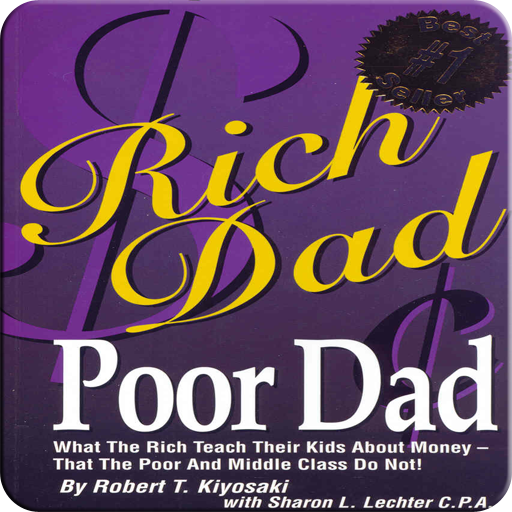“Dad said this would happen. He said to meet with him when you were ready to quit.”
“我爸說(shuō)早料到你會(huì)退出,他說(shuō)如果你不想干了就讓我?guī)闳ヒ?jiàn)他。”
“What?” I said indignantly. “He’s been waiting for me to get fed up?”
“什么?”我覺(jué)得自己被耍了,于是氣憤地問(wèn),“他早就在等我去找他?”
“Sort of,” Mike said. “Dad’s kind of different. He teaches differently from your dad. Your mom and dad lecture a lot. My dad is quiet and a man of few words. You just wait till this Saturday. I’ll tell him you’re ready.”
“是的,我爸爸可不是一般人,他跟你爸的教育方法不一樣。你爸你媽說(shuō)得多,我爸說(shuō)得少,不過(guò)他早就猜到你會(huì)這么說(shuō)了。你要等到這個(gè)星期六,我會(huì)告訴他你已經(jīng)準(zhǔn)備好了。”
“You mean I’ve been set up?”
“你是說(shuō)我被耍了?”
“No, not really, but maybe. Dad will explain on Saturday.”
“不,還不肯定,但有可能。我爸爸會(huì)在星期六說(shuō)明的。”

I was ready to face him and I was prepard. Even my real dad was angry with him. My real dad, the one I call the poor one, thought that my rich dad was violating child labor laws and should be investigated.
我已經(jīng)準(zhǔn)備好要面對(duì)邁克的爸爸,就連我的親爸爸也生氣了。我的親爸爸,我叫他窮爸爸,認(rèn)為我的富爸爸違反了《童工法》,應(yīng)該受到調(diào)查。
My educated,dad told me to demand what I deserve—at least 25 cents an hour. My poor dad told me that if I did not get a raise, I was to quit immediately.
我爸爸要我去爭(zhēng)取應(yīng)有的待遇。每小時(shí)至少應(yīng)該得到25美分。爸爸說(shuō)如果我得不到加薪,就應(yīng)該立即辭職。
At eight o’clock Saturday morning, I walked through the door of Mike’s house when Mike’s dad opened it.
星期六早上8點(diǎn),我又穿過(guò)了邁克家那扇搖晃著的紗門。
“Take a seat and wait in line,” Mike's dad said as I entered. He turned and disappeared into his little office next to a bedroom.
“坐下等著。”我一進(jìn)門邁克的爸爸就對(duì)我說(shuō),說(shuō)完便轉(zhuǎn)身消失在臥室邊的小辦公室里。
I looked around the room and didn’t see Mike anywhere. Feeling awkward, I cautiously sat down next to the same two women who were there four weeks earlier. They smiled and slid across the couch to make room for me.
我環(huán)視整個(gè)房間,沒(méi)看見(jiàn)邁克,我感到有些局促,小心地坐到了沙發(fā)上,4個(gè)星期前我見(jiàn)過(guò)的那兩個(gè)女人笑著給我挪出了點(diǎn)地方。
Forty-five minutes went by, and I was steaming. The two women had met with him and left 30 minutes earlier. An older gentleman was in there for 20 minutes and was also gone.
45分鐘過(guò)去了,我開(kāi)始生氣了。那兩個(gè)女人已經(jīng)見(jiàn)了邁克的爸爸,并且在30分鐘之前就離開(kāi)了。那個(gè)年紀(jì)大的男人待了20分鐘也辦完事走了。
The house was empty, and here I sat in a musty, dark living room on a beautiful sunny Hawaiian day, waiting to talk to a cheapskate who exploited children. I could hear him rustling around the office, talking on the phone, and ignoring me. I was ready to walk out, but for some reason I stayed.
一個(gè)小時(shí)過(guò)去了,那天陽(yáng)光燦爛,我卻坐在陰暗、發(fā)霉的客廳里,等待著和一個(gè)剝削童工的吝嗇鬼談判。我能聽(tīng)見(jiàn)他在辦公室里走動(dòng)、打電話,但他就是不理我。我很想出去,但不知為什么我還是留下來(lái)了。
Finally, 15 minutes later, at exactly nine o’clock, rich dad walked out of his office, said nothing, and signaled with his hand for me to enter his dingy office.
最后,又過(guò)了15分鐘,正好9點(diǎn),富爸爸終于走出了他的辦公室。他什么也沒(méi)說(shuō),用手示意我跟著他去那間陰暗的辦公室。












